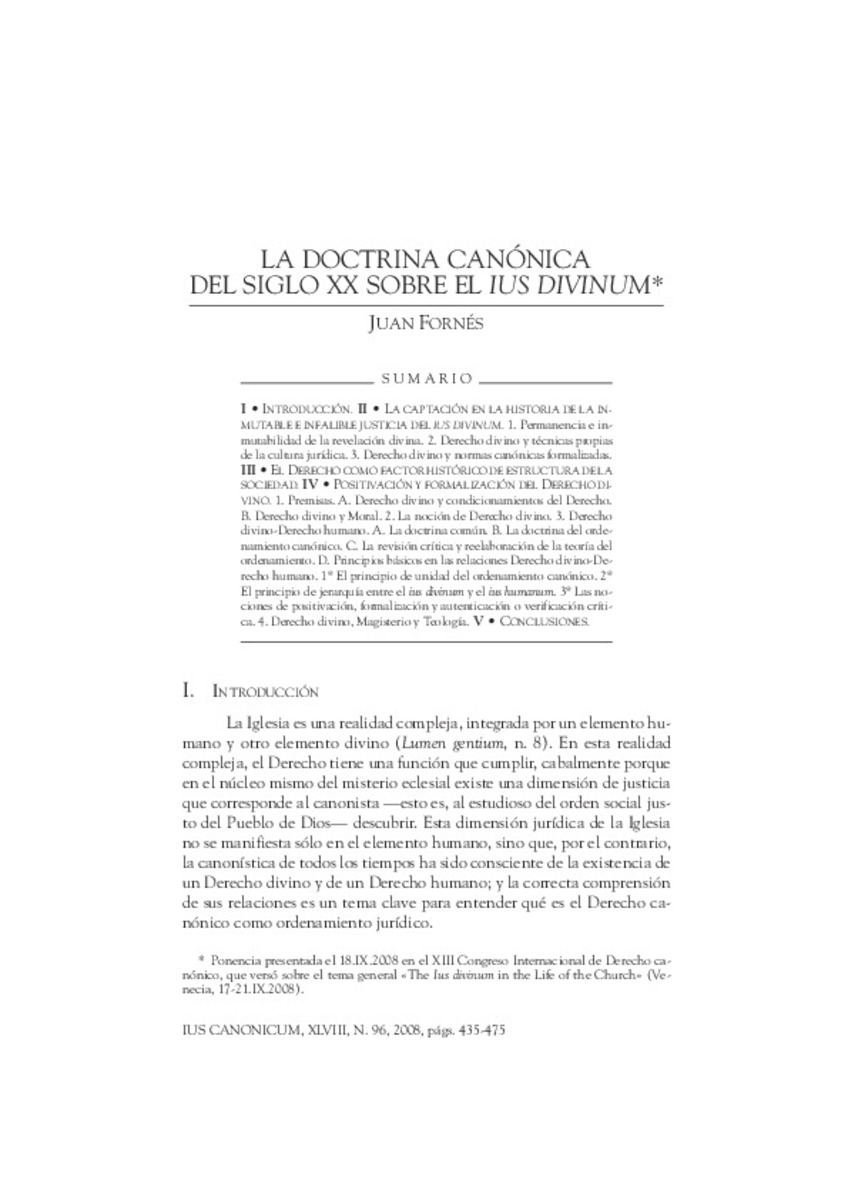Full metadata record
| DC Field | Value | Language |
|---|---|---|
| dc.creator | Fornés, J. (Juan) | - |
| dc.date.accessioned | 2013-11-20T16:38:18Z | - |
| dc.date.available | 2013-11-20T16:38:18Z | - |
| dc.date.issued | 2008-12 | - |
| dc.identifier.citation | IUS CANONICUM, 2008, XLVIII, N. 96, págs. 435-475 | es_ES |
| dc.identifier.issn | 0021-325X | - |
| dc.identifier.uri | https://hdl.handle.net/10171/34517 | - |
| dc.description.abstract | El Derecho divino es el conjunto de factores que componen la dimensión de justicia inherente al 'mysterium Ecclesiae'. Conviene no confundir el Derecho divino con su expresión histórica, que se realiza de los medios técnicos que la cultura jurídica de cada momento proporciona. La justicia divina es inmutable e irreformable; pero su captación y paso a la vigencia histórica del contenido concreto ('positivación') y su expresión mediante los adecuados instrumentos técnico-jurídicos ('formalización') son progresivas y, en ocasiones, reformables, porque pueden presentar elementos de Derecho humano. El Derecho divino y el humano no constituyen dos sistemas de Derecho separados, sino que se integran en la unidad del ordenamiento canónico. La tarea de 'autenticación' de lo que verdaderamente es exigencia del Derecho divino y lo que no lo es corresponde al Magisterio de la Iglesia; es, en su fase última y decisiva, algo extracientífico que compete al ministerio jerárquico. ------ The divine law is a group of factors which composes the dimension of justice inherent to the 'mysterium Ecclesiae'. It is convenient not to refuse the divine law with its historical expression, which is realized by the technical means which the juridical culture of every moment provides. The divine justice is immutable and irreformable; but its comprehension and its having to be in force in history of concrete content ('positivation') and its expression through the adequate technico-juridical instruments ('formalization') are progressive and, in some occasions, reformable because it can present elements of human law. The divine and the human law do not constitute two systems of separate law, but are integrated in the unity of the canon law. The work of 'authentication' of what truly is the exigency of the divine law and of what is not, corresponds to the Magisterium of the Church; it is, in its ultimate and decisive phase, something extra-scientific which is the competence of the hierarchical ministry. | es_ES |
| dc.language.iso | spa | es_ES |
| dc.publisher | Instituto Martín de Azpilcueta | es_ES |
| dc.rights | info:eu-repo/semantics/openAccess | es_ES |
| dc.subject | Derecho Canónico | es_ES |
| dc.subject | Canonizatio | es_ES |
| dc.subject | Positivación | es_ES |
| dc.subject | Formalización | es_ES |
| dc.subject | Positivation | es_ES |
| dc.subject | Formalization | es_ES |
| dc.title | La doctrina canónica del siglo XX sobre el 'Ius divinum' | es_ES |
| dc.type | info:eu-repo/semantics/article | es_ES |
| dc.identifier.doi | 10.15581/016.48.14173 | es_ES |
Files in This Item:
Statistics and impact
Items in Dadun are protected by copyright, with all rights reserved, unless otherwise indicated.






